
David Hume was a Scottish Enlightenment philosopher, historian, economist, librarian, and essayist, who is best known today for his highly influential system of philosophical empiricism, skepticism, and naturalism. Beginning with A Treatise of Human Nature (1739–40), Hume strove to create a naturalistic science of man that examined the psychological basis of human nature. Hume argued against the existence of innate ideas, positing that all human knowledge derives solely from experience. This places him with Francis Bacon, Thomas Hobbes, John Locke, and George Berkeley as an empiricist.

George Boole was a largely self-taught English mathematician, philosopher, and logician, most of whose short career was spent as the first professor of mathematics at Queen's College, Cork in Ireland. He worked in the fields of differential equations and algebraic logic, and is best known as the author of The Laws of Thought (1854) which contains Boolean algebra. Boolean logic is credited with laying the foundations for the Information Age.

Hermann Ludwig Ferdinand von Helmholtz was a German physicist and physician who made significant contributions in several scientific fields, particularly hydrodynamic stability. The Helmholtz Association, the largest German association of research institutions, is named in his honor.
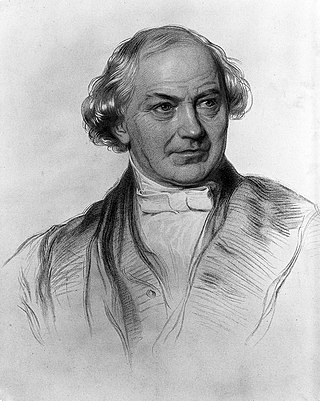
William Whewell was an English polymath, scientist, Anglican priest, philosopher, theologian, and historian of science. He was Master of Trinity College, Cambridge. In his time as a student there, he achieved distinction in both poetry and mathematics.
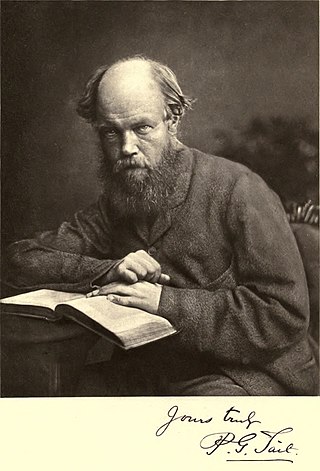
Peter Guthrie Tait was a Scottish mathematical physicist and early pioneer in thermodynamics. He is best known for the mathematical physics textbook Treatise on Natural Philosophy, which he co-wrote with Lord Kelvin, and his early investigations into knot theory.

The Commentaries on the Laws of England are an influential 18th-century treatise on the common law of England by Sir William Blackstone, originally published by the Clarendon Press at Oxford between 1765 and 1769. The work is divided into four volumes, on the rights of persons, the rights of things, of private wrongs and of public wrongs.
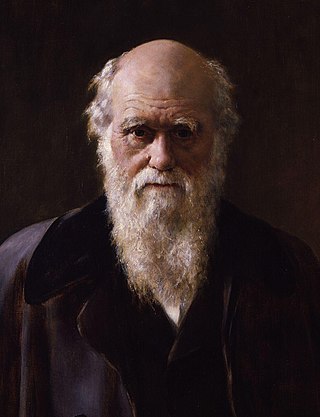
The Darwin Medal is one of the medals awarded by the Royal Society for "distinction in evolution, biological diversity and developmental, population and organismal biology".

Sir Frederick Pollock, 3rd Baronet PC, FBA was an English jurist best known for his History of English Law before the Time of Edward I, written with F.W. Maitland, and his lifelong correspondence with US Supreme Court Justice Oliver Wendell Holmes. He was a Cambridge Apostle.
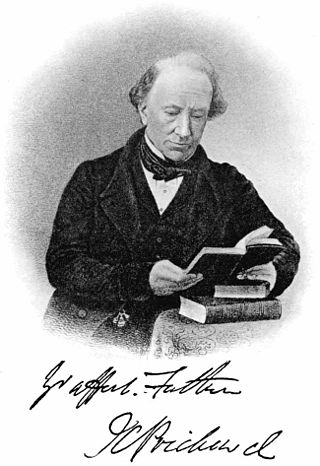
James Cowles Prichard, FRS was a British physician and ethnologist with broad interests in physical anthropology and psychiatry. His influential Researches into the Physical History of Mankind touched upon the subject of evolution. From 1845, Prichard served as a Medical Commissioner in Lunacy. He also introduced the term "senile dementia".
William Grant, Lord Grant, was a Scottish advocate, a Unionist politician, and a judge. Born to the Grant's distillery family who created Glenfiddich whisky, he was one of Scotland's Great Officers of State for the last twelve years of his life.

James Lorimer of Kellyfield, FRSE LLD was a Scottish advocate and professor of public law. He was an authority on international law.
Alexander Donaldson was a Scottish bookseller, publisher, and printer. Donaldson was the founding publisher of the weekly newspaper, the Edinburgh Advertiser. He was also known for selling cheap copies of books after their copyright had expired in disregard to London booksellers' opinions on literary property.
Commentaries on American Law is a four-volume book by James Kent. It was adapted from his lectures at Columbia Law School starting in 1794. It was first published in 1826 by O. Halsted and has been reprinted and revised many times since. A twelfth edition was edited by Oliver Wendell Holmes, Jr. A fourteenth edition edited by John M. Gould was published in 1896, and a fifteenth edition edited by Jon Roland was published 1997-2002.
Les Reports des divers Cases en le Court del Common Bank, en le several Reignes de Hen. VII., Hen. VIII., Edw. VI., et Mar. et Eliz. is a collection of nominate reports, attributed to Gulielme Benloe and Gulielme Dalison, of cases decided by the Court of Common Pleas between approximately 1486 and 1580. For the purpose of citation, their name may be abbreviated to "Ben & D". They are reprinted in volume 123 of the English Reports.
Reports in Common Pleas and Exchequer, from E.T. 28 G. III., 1788, to H.T. 36 G. III., 1796 is the title of a collection of nominate reports, by Henry Blackstone, the nephew of Sir William Blackstone, of cases decided between approximately 1788 and 1796. For the purpose of citation their name may be abbreviated to "Bl H". They are in two volumes. They are reprinted in volume 126 of the English Reports.
Reports in K.B. and C.P., from 1746 to 1779 is the title of a collection of nominate reports, by Sir William Blackstone, of cases decided between approximately 1746 and 1780. For the purpose of citation their name may be abbreviated to "Black W" or "Bl W". They are in two volumes. They are reprinted in volume 96 of the English Reports.
A Treatise on Crimes and Misdemeanours or Russell on Crime is a book originally written by William Oldnall Russell. For the purpose of citation, its name may be abbreviated to Russ Cr.
John Scott (c.1846–1909) was a Scottish consulting agriculturist, agricultural engineer, and pioneer of motorised farming. He is credited with the invention of the tractor power take-off.
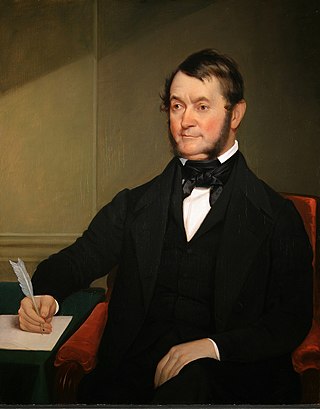
Joseph Kinnicutt Angell was an American legal writer born in Providence, Rhode Island. He graduated from Brown University with a Bachelor of Arts, and was admitted to the bar association of Rhode Island in 1816. Angell stayed in London from 1820 to 1822 to attend a case about an estate before the Court of Chancery. There, he spent most of his time at the Palace of Westminster and the Oxford University library, ultimately deciding to be a legal writer. He wrote various books and articles on topics that included property in tidewaters, incorporeal hereditaments, limitations of actions, and corporate tax. He served as the reporter of the decisions of the Supreme Court of Rhode Island from 1845 to 1849. During his term, he published two pamphlets about various cases of the supreme court. He died on May 1, 1857, in Boston, Massachusetts.











